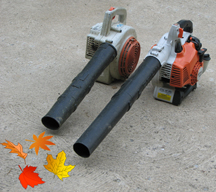 A group hoping to limit the use of gas-powered leaf-blowers in Lincoln will hold a public forum on Thursday, Feb. 28 at 7 p.m. in the Town Office Building to discuss regulations that will be voted on at the Annual Town Meeting in March.
A group hoping to limit the use of gas-powered leaf-blowers in Lincoln will hold a public forum on Thursday, Feb. 28 at 7 p.m. in the Town Office Building to discuss regulations that will be voted on at the Annual Town Meeting in March.
The Leaf Blower Study Group (now a subcommittee of the Conservation Commission) is proposing a bylaw that would place limits on when leaf blowers can be used. It would allow use of any type of leaf blowers in the fall and spring but only electric machines in the summer, and it would prohibit their use entirely from December 16 to April 14. From June to September, leaf blower use would be permitted during certain hours seven days of the week, though on Sundays, only residents of the property on which the leaf blower is being used may do so.
Leaf blowers could be used at any time for public safety and emergency situations, such as for cleanup after storms. The town’s building inspector could also grant one-day exemptions for users dealing with special situations and not ongoing routine maintenance, and there would be no rules on decibel levels.
“The idea is to regulate leaf blower use, not eliminate it,” group vice chair John Koenig explained in a presentation to the Board of Selectmen in December.
“It’s noncontroversial — there are so many studies that there is consensus that this is toxic and carcinogenic,” said Jamie Banks, chair of the group, which has gathered extensive research on the issue. Leaf blowers pose a health risk from airborne particles and exhaust, as well as noise pollution, research shows. Fuel spillage and maintenance chemicals are also harmful to the environment.
“The proposed bylaw is not a ban, but [instead] places reasonable limits on the use of noisy, polluting blowers for reasons of health, environment, and quality of life,” Banks said.
The Board of Health agreed in 2015 that “exposure to high-intensity, episodic or long-duration noise and air particulate and vapor dispersion from leaf blowers represents significant potential health hazards to our citizens” and members supported “efforts to craft effective and economically sound approaches to mitigate those health risks.”
The issue first came before the town in 2015, when the group proposed more sweeping restrictions. They submitted a citizens’ petition for a Town Meeting vote but later withdrew the item in the face of opposition and opted for more public education instead.
Thanks to its efforts and equipment demonstrations since 2015, town maintenance workers now use electric leaf blowers when possible, and property owners including the Rural Land Foundation have limited the use of the machines in the mall area, because the health risks of leaf blowers are much higher when they’re used to clear dirt and debris from hard surfaces such as sidewalks and streets.
“Now we feel like we’re ready for the next step,” Conservation Commission chair Peter von Mertens said, referring to the proposed bylaw.
At their December meeting, selectmen were initially lukewarm to the proposed bylaw, since there had been little public communication about it to that point (such as during November’s State of the Town meeting) and no formal solicitation of opinion since a 2014 survey.
“I would like to know more about the extent to which the people in Lincoln think this is a problem to be solved immediately,” Selectman Jonathan Dwyer said. “I feel like we have a lot of problems in town to solve right now and people only have a certain amount of capacity to deal with all of them.”
“I just have the sense there will be lots of questions raised” about how the leaf blower group formulated its proposed regulation, Selectman Jennifer Glass said.
“It would be very helpful for me” to hear feedback from public outreach before deciding on his stance on the proposal, Selectman James Craig said. The board will vote on whether to endorse the bylaw in early March.
Banks noted that public education was more difficult before the group became formally aligned with the Conservation Commission because it had no budget; “it was not due to lack of intent or effort.”